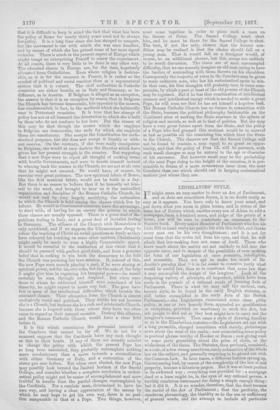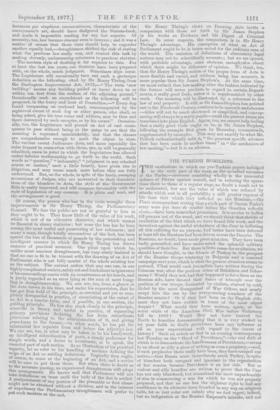LEGISLATORS' STYLE.
I T might seem an easy matter to draw an Act of Parliament,
and as Acts are sometimes drawn, it is no doubt really as easy as it appears. You have only to know your mind, and put down what you mean in plain terms, and in virtue of the same law of Nature which enables every son of Adam to edit a newspaper, farm a hundred acres, and judge of the points of a horse, you will be sure to contribute an ornament to the Statute-book. Every active Member of Parliament who has his little Bill on hand starts his public life with this belief, and thinks every man can be his own draughtsman ; and it is not for some time that the scales fall from his eyes, and that he will admit that law-making does not come of itself. Those who know much about the matter are not unlikely to fall into the opposite error, and to despair of the possibility of ever making the form of our legislation at once accurate, intelligible, and accessible. They are apt to make too much of Mr. Austin's paradex that "it is far easier to conceive justly what would be useful law, than so to construct that same law that it may accomplish the design of the lawgiver." Look at the despairing variety of attempts, all imperfect, which have been made in the pursuit of a rational mode of framing Acts of Parliament. There is what we may call the ancient, curt, laconic style, to be found in the early English statutes, or still better exemplified in the early Acts of the Scotch Parliament,—the Legislature enunciated some clear, pithy policy, in one or two homely lines, appended no qualification or exceptions, provided no machinery to work the Act, but left people to find out as they best might how to carry out the lawgiver's commands. Then came a style of drawing familiar to us in the Elizabethan statutes—the Legislature set out with a long preamble, charged sometimes with stately, picturesque saws about the weal of the realm ; now enunciating some policy in poetical phrase worthy of Hooker or Bacon ; now giving vent to some petty grumbling about the price of cloth, or the wickedness of the times. The Statutes, thus prefaced, consisted, as a rule, of a few strong assertions, rarely exhaustive of the whole law 'on the subject, and generally requiring to be pieced out with the Common Law. In later times, a different fashion sprang up. Conveyancing had, by reason of the complexity of the law of real property, become a laborious jargon. But.it was at least perfect in its awkward way ; everything was provided for ; a mortgage deed or a lease might be, in the eyes of any rational person, a terribly cumbrous instrument for doing a simple enough thing ; but it did it, It is no wonder, therefore, that the deed became the model of the Act of Parliament ; that the prolixity, the cumbrous phraseology, the timidity as to the use or sufficiency of general words, arid the attempt to include all particular
instances per sintplicem enumerationem, characteristic of the conveyancer's art, should have disfigured the Statute-book, and made it impossible reading for any but experts. Of necessity, too, law became obscure even to lawyers ; and it was a matter of course that these vices should help to engender another equally bad,—draughtsmen shirked the risk of stating what the previous law really was, and evaded this task by making slovenly, embarrassing references to previous statutes.
The modern style of drafting is far superior to this. For at least the last ten years, our Statutes have been prepared with, on the whole, much judgment. Sometimes slips occur. The Legislature will occasionally turn out such a grotesque definition as the following, cited by Sir Henry Thring, from the Darlington Improvement Act, 1872,—" The term 'new building' means any building pulled or burnt down to or within ten feet from the surface of the adjoining ground." Occasionally such an amendment as the following will be proposed, in the hurry and heat of Committee," Every dog found trespassing on enclosed land, unaccompanied by the registered owner of such dog or other person, who shall, on being asked, give his true name and address, may be then and there destroyed by such occupier, or by his owner." Occasion- ally, too, the Legislature will permit an Aet of vast conse- quence to pass without being at the pains to. see that the meaning is expressed unmistakably, and that the clauses are comprehensive enough to meet the object in view. The various recent Judicature Acts, and more especially the rules framed in connection with them, are, as will be generally admitted, oases in point in which the Legislature has allowed rather inferior workmanship to go forth to the world. Such words as " question," "indemnity," "judgment in any criminal course or matter," used a little loosely, have given rise to litigation, and may cause much more before they are hilly understood. But, on the whole, in spite of the hasty, sweeping accusations of Judges, who are unwearied in their denuncia- tions of the blunders in Acts, the style of the Government Bills is vastly improved, and will compare favourably with the style of legislation of any country. It is plain and neat, and the arrangement is good.
Of course, the person who has in the main wrought these improvements is Sir Henry Thring, the Parliamentary Counsel. We fear the public are not so grateful to him as they ought to be. They know little of the value of his work, which is not of an obtrusive character, and which cannot be flaunted in showy statistics ; but none the less has he been among the most useful and persevering of law reformers ; and many a man, though totally unconscious of the fact, has been spared the loss of thousands of pounds by the painstaking and intelligent manner in which Sir Henry Thring has drawn statutes of practical moment. One point upon which he, unlike most amateur draughtsmen, has very wisely insisted is that no one is fit to be trusted with the drawing of an Act of Parliament who is not fully master of the whole existing law on the subject. The current notion that any one can, in our highly complicated society, safely cut and hack about in ignorance of his surroundings meets with no countenance at his hands, and is justly regarded as an error lying at the root of most bung- ling in draughtsmanship. We can see, too, from a glance at the Acts drawn in his time, and under his supervision, that he has got firm hold of the principle, so essential and yet so com- pletely disregarded in practice, of enunciating at the outset of an Act in a concise form, and if possible, in one section, the guiding principle. He has also stuck closely to the principle, scientific in theory and useful in practice, of separating primary provisions declaring the law from subordinate provisions relating to the administration of it, and giving precedence to the forrner,—in other words, he has put the substantial law separate from and before the adjective law. We can see, too, in what may be taken to be his handywork, an intelligent subordination of parts, a steady preference for simple words, and a desire to accentuate, so to speak, the essential part of each section. As an illustration of his practical sagacity, let us refer to his handling of sections defining the scope of an Act or settling definitions. Logically they ought, of course, to come at the beginning of an Act, and a novice will be sure to put them there. But when there is doubt as to the measure passing, no experienced draughtsman will adopt this arrangement. He knows well that. Parliament will not take definitions on trust until the body of the Act is settled. A postponement of anyp ortion of the preamble or first clause might not be obtained without a division, and in the interest of expediency the Parliamentary draughtsmen will prefer to put such matters at the end. Sir Henry Thring's views on Drawing Acts invite a comparisen with those set forth by Sir James Stephen in his works on Evidence and his .Digest of Criminal Law, In some respects, the comparison is to Sir Henry Thring's advantage. His conception of what an Act of Parliament ought to be is better suited for the ordinary uses of the world. The omission of definitions of elementary legal notions may not be scientifically accurate ; but we are spared, with probable advantage, some abstruse metaphysics about which there might be difference of opinion. We think, too, that Sir Henry Thing's notion of the proper form of Acts is more flexible and varied, and without being less accurate, is more popular than Sir James .Stephen's. At the same time,. we must submit that law-making .after the fashion indicated by the former will never produce, in regard to certain Depart. month, a really good Code, unless it is supplemented by other work. Our meaning will be illustrated by a reference to the law of real property. It will, as Sir James Stephen has pointed out in the Nineteenth Century, continue to be uncouth and obscure —titles will not be much shortened or simplified, and convey- ancing will always be a costly puzzle—until the present terms are translated into plain English. Again, too, we cannot help feeling that a really good Code ought to be, as Sir James Stephen, following the example first given by Macaulay, recommends, supplemented by examples. This may not exactly be what Mr. Pollock enthusiastically calls it, "the greatest specific advance that has been made in modern times" in "the mechanics of law-making,"—but it is an advance.































 Previous page
Previous page